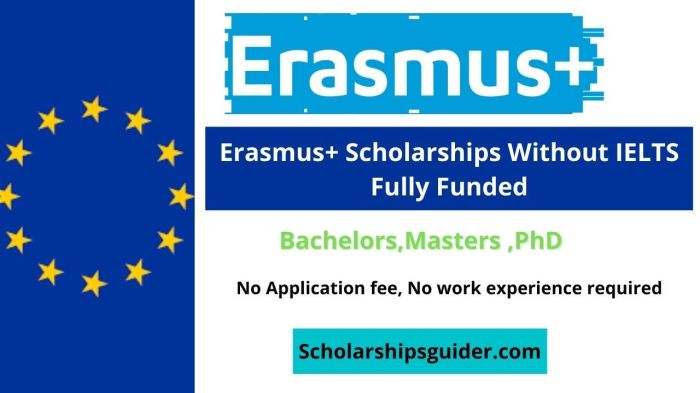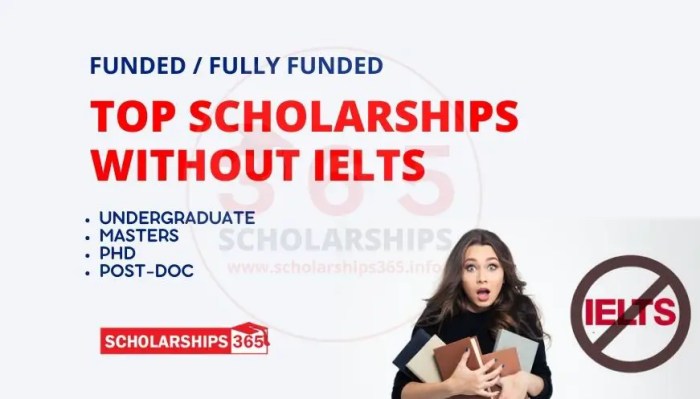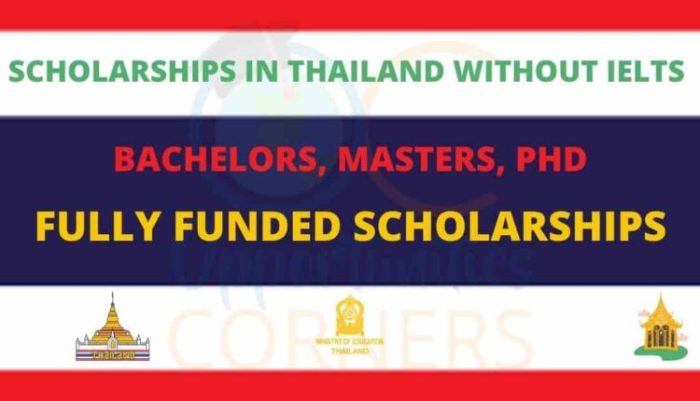10 Steps to Apply for Fully Funded Scholarships Without IELTS sets the stage for this enthralling narrative, offering readers a glimpse into a story that is rich in detail with scientific with objective tone style and brimming with originality from the outset.
Fully funded scholarships offer a gateway to education without the hurdle of IELTS. This guide presents a strategic approach to securing these scholarships, ensuring international students can pursue their academic dreams with ease.
Introduction to Fully Funded Scholarships Without IELTS
Fully funded scholarships are financial aids provided by universities, organizations, or governments that cover tuition fees, living expenses, and sometimes even travel costs for international students. These scholarships are highly competitive and sought after due to the extensive support they offer to students pursuing higher education abroad.
Significance of Applying Without IELTS, 10 Steps to Apply for Fully Funded Scholarships Without IELTS
Not requiring the IELTS (International English Language Testing System) exam for fully funded scholarships opens up opportunities for students who might face challenges with the language proficiency test. By eliminating this requirement, more students have access to these scholarships, regardless of their English language skills.
Benefits of Fully Funded Scholarships Without IELTS for International Students
- Increased Access: Removing the IELTS requirement expands the pool of eligible applicants, allowing more international students to apply for fully funded scholarships.
- Reduced Stress: Students who are not confident in their English proficiency can focus on showcasing their academic achievements and other qualifications without the added pressure of preparing for and taking the IELTS exam.
- Equal Opportunity: By waiving the IELTS requirement, scholarships promote inclusivity and diversity, ensuring that students from various linguistic backgrounds have an equal chance at receiving financial support for their studies.
- Enhanced Diversity: With a more diverse group of scholarship recipients, educational institutions benefit from different perspectives, experiences, and cultures, enriching the learning environment for all students.
Researching Fully Funded Scholarships
When looking for fully funded scholarships, it is crucial to conduct thorough research to ensure you find the best opportunities that match your qualifications and interests. Here are some tips on where to find information about these scholarships, the eligibility criteria, and why research is essential before applying.
Finding Information
Researching fully funded scholarships can be done through various sources such as:
- Official websites of universities and organizations
- Scholarship search engines and databases
- Social media platforms and forums dedicated to scholarship opportunities
- Networking with academic advisors, professors, and professionals in your field
Eligibility Criteria
Before applying for fully funded scholarships, make sure to carefully review the eligibility criteria, which may include:
- Academic excellence and achievements
- Language proficiency requirements (such as English proficiency tests like TOEFL or IELTS)
- Financial need or merit-based qualifications
- Specific criteria related to the field of study or research area
Importance of Research
Thorough research is essential before applying for fully funded scholarships because:
- It helps you identify the most suitable scholarship opportunities based on your qualifications and goals
- Allows you to understand the application process and requirements, increasing your chances of success
- Enables you to tailor your application to meet the specific criteria of each scholarship, showcasing your strengths effectively
- Ensures you do not miss out on any potential opportunities that align with your academic and career aspirations
Understanding the Application Process

When applying for fully funded scholarships without IELTS, it is essential to understand the specific steps involved in the application process, the requirements needed, and how to prepare the necessary documentation.
General Steps in Applying for Scholarships
- Research and Identify Scholarships: Begin by researching and identifying fully funded scholarships that do not require IELTS.
- Check Eligibility Criteria: Make sure you meet all the eligibility criteria set by the scholarship provider.
- Prepare Required Documents: Gather all the necessary documents, such as academic transcripts, recommendation letters, and personal statements.
- Submit Application: Complete the application form and submit it before the deadline.
- Attend Interviews (if required): Some scholarships may require you to attend interviews as part of the selection process.
Specific Requirements for Applications Without IELTS
- Alternative Language Proficiency Tests: Some scholarships may accept alternative language proficiency tests such as TOEFL or PTE instead of IELTS.
- English-taught Previous Degrees: Having completed a degree in English or from an English-speaking institution may exempt you from providing IELTS scores.
- Proof of Work Experience: Providing evidence of work experience in an English-speaking environment can sometimes substitute the need for IELTS scores.
Preparing Necessary Documentation
- Academic Transcripts: Make sure to have your academic transcripts from previous educational institutions ready for submission.
- Recommendation Letters: Request recommendation letters from professors or employers that highlight your skills and achievements.
- Personal Statement: Write a compelling personal statement that showcases your academic goals, achievements, and motivation for applying for the scholarship.
- CV/Resume: Update your CV or resume to reflect your educational background, work experience, and any relevant skills or certifications.
- Additional Requirements: Be aware of any additional documents or requirements specified by the scholarship provider and ensure you have them prepared.
Highlighting Alternative Language Proficiency Tests

When applying for fully funded scholarships without IELTS, it is crucial to consider alternative language proficiency tests that are accepted by universities and scholarship providers. These tests serve as substitutes for IELTS and allow applicants to demonstrate their English language proficiency through different assessments.
TOEFL (Test of English as a Foreign Language)
- TOEFL is one of the most widely accepted alternative language proficiency tests.
- It consists of four sections: Reading, Listening, Speaking, and Writing.
- TOEFL scores are valid for two years from the test date.
PTE (Pearson Test of English)
- PTE is another popular alternative to IELTS.
- It evaluates English language skills through tasks like reading, writing, listening, and speaking.
- PTE scores are generally recognized by universities and scholarship providers.
Duolingo English Test
- The Duolingo English Test is a relatively newer option for showcasing English proficiency.
- It is an online test that assesses reading, writing, speaking, and listening skills.
- Some universities and scholarship programs have started accepting Duolingo scores as a valid alternative.
Cambridge English Exams
- Cambridge English Exams, such as C1 Advanced (CAE) and C2 Proficiency (CPE), are also recognized by many institutions.
- These exams evaluate language proficiency at advanced levels and are widely accepted.
- They assess all language skills, including reading, writing, listening, and speaking.
Crafting a Strong Personal Statement

Writing a compelling personal statement is crucial when applying for fully funded scholarships without IELTS. This is your opportunity to showcase your unique qualities, experiences, and goals to the scholarship committee. A well-written personal statement can set you apart from other applicants and increase your chances of securing the scholarship.
Want to win scholarships with minimal effort? Discover these 5 Ways to Win Scholarships with Minimal Effort that can help you stand out and secure funding for your education.
Tips for Writing a Compelling Personal Statement
- Start early and take your time to brainstorm and Artikel your statement.
- Showcase your passion, motivation, and dedication to your field of study.
- Be authentic and genuine – avoid using cliches or exaggerating your accomplishments.
- Highlight your relevant experiences, skills, and achievements that make you a strong candidate.
- Proofread and edit your statement multiple times to ensure clarity and coherence.
Key Elements to Include in the Personal Statement
- Your academic and career goals, and how the scholarship will help you achieve them.
- Your personal background, experiences, and how they have shaped your aspirations.
- Your strengths, skills, and qualities that make you a deserving candidate for the scholarship.
- Your reasons for choosing the specific program or institution and how it aligns with your goals.
- Your future plans and how you intend to give back to your community or field of study.
Examples of Successful Personal Statements for Scholarships
“My passion for environmental conservation started at a young age, growing up in a rural community surrounded by nature. This scholarship would not only allow me to pursue my dream of becoming an environmental scientist but also make a positive impact on the world around me.”
Are you majoring in agriculture or farming? Check out these 7 Scholarships for Agriculture and Farming Majors that can help fund your education and future career in the field.
“As a first-generation college student, I have overcome numerous challenges to excel academically and volunteer in my community. This scholarship would provide me with the opportunity to continue my education and give back to others who face similar obstacles.”
If you’re looking to pursue vocational training, don’t miss these 6 Steps to Apply for Vocational Training Scholarships to help you navigate the application process and secure financial aid for your studies.
Securing Strong Letters of Recommendation: 10 Steps To Apply For Fully Funded Scholarships Without IELTS
Securing strong letters of recommendation is a crucial step in the scholarship application process. These letters provide insight into your character, work ethic, and academic abilities, giving the selection committee a better understanding of who you are as a candidate.
Choosing the Right Recommenders
When selecting recommenders, it is essential to choose individuals who know you well and can speak to your qualifications for the scholarship. Opt for professors, employers, or mentors who can provide specific examples of your skills and achievements.
- Consider individuals who can highlight different aspects of your profile, showcasing a well-rounded view of your capabilities.
- Avoid choosing recommenders based solely on their title or position. Focus on those who can provide detailed and personalized insights into your strengths.
- Ensure that your recommenders are willing to dedicate time to crafting a thoughtful and compelling letter on your behalf.
Requesting and Securing Impactful Recommendation Letters
When requesting recommendation letters, approach your chosen recommenders with respect and gratitude. Clearly Artikel the scholarship requirements and deadlines, providing them with all necessary information to support your application effectively.
Are you an athlete with exceptional skills seeking scholarships? Check out these 5 Scholarships for Athletes with Exceptional Skills that can provide financial support for your athletic and academic pursuits.
- Request letters well in advance to give recommenders ample time to write thoughtful and tailored recommendations.
- Provide recommenders with relevant information about the scholarship, your academic goals, and any specific points you would like them to address.
- Follow up with recommenders to ensure they have submitted the letters on time. Express your appreciation for their support throughout the process.
Navigating the Interview Process

When applying for fully funded scholarships without IELTS, it is essential to be prepared for the possibility of interviews as part of the application process. Scholarship interviews give the selection committee a chance to learn more about you beyond your written application, so it is crucial to make a positive impression during this stage.
Tips for Preparing for Scholarship Interviews
- Research the scholarship organization and its values to understand what they are looking for in candidates.
- Practice common interview questions and prepare thoughtful responses that highlight your achievements, goals, and aspirations.
- Dress professionally and maintain good body language to convey confidence and professionalism during the interview.
- Prepare questions to ask the interviewers to show your interest in the scholarship and the organization.
Common Interview Questions and Effective Responses
- 1. Tell us about yourself.
Focus on your academic background, extracurricular activities, and career goals.
Are you a college freshman in the USA looking for financial aid? Explore these 5 Scholarships for College Freshmen in the USA to help support your academic journey and future career goals.
- 2. Why are you interested in this scholarship?
Highlight how the scholarship aligns with your academic and career objectives.
- 3. How do you plan to make a difference in your field of study?
Show enthusiasm for your chosen field and discuss your long-term goals and aspirations.
- 4. Can you provide an example of a challenge you have overcome?
Share a specific example that demonstrates your resilience and problem-solving skills.
Submitting a Complete and Polished Application
To increase your chances of securing a fully funded scholarship without IELTS, it is crucial to submit a well-organized and polished application. This demonstrates your attention to detail and professionalism to the scholarship committee.
Checklist for Ensuring All Required Documents are Included
- Completed application form
- Transcripts and academic records
- Personal statement or essay
- Letters of recommendation
- Proof of language proficiency (if applicable)
- CV or resume
- Any additional required documents specified by the scholarship provider
Significance of Meeting Deadlines for Scholarship Applications
Meeting deadlines for scholarship applications is crucial as late submissions are typically not accepted. Missing a deadline could mean missing out on a valuable opportunity to secure funding for your studies. It also reflects poorly on your organizational skills and commitment.
Exploring Additional Funding Opportunities

When it comes to seeking financial support for your education as an international student, there are various avenues you can explore beyond fully funded scholarships. These additional funding opportunities can help you cover your expenses and make your academic journey more affordable.
Scholarships and Grants
- Look for partial scholarships or grants offered by universities, organizations, or government bodies. Even if they don’t cover all expenses, they can still provide significant financial assistance.
- Research country-specific scholarships that may be available for international students studying in a particular region.
- Consider applying for subject-specific scholarships that are tailored to your field of study or research interests.
Financial Aid Programs
- Explore financial aid programs offered by universities that can help cover tuition fees, living expenses, or other educational costs.
- Check if there are any need-based financial aid options available for international students at the institutions you are applying to.
- Look into work-study programs that allow you to work part-time while studying to support your financial needs.
Tips for Maximizing Financial Support
- Start your search for funding opportunities early to have enough time to research and apply for various scholarships, grants, and financial aid programs.
- Customize your applications for each funding opportunity by highlighting your achievements, experiences, and future goals that align with the scholarship or grant criteria.
- Seek guidance from academic advisors, career counselors, or scholarship offices to explore all possible funding options and receive assistance with your applications.
Following Up After Submitting Applications
Following up after submitting scholarship applications is a crucial step in the process to ensure that your application is being reviewed and to demonstrate your continued interest in the opportunity. In this stage, you can inquire about the status of your application and take necessary steps based on the response you receive.
Importance of Post-Application Follow-Up
- Reaffirm your interest: Following up shows your dedication and interest in the scholarship.
- Stay informed: Inquiring about the status keeps you updated on the progress of your application.
- Clarify doubts: You can seek clarification on any aspects of the application process or requirements.
Inquiring About the Status of Your Application
- Contact the scholarship provider: Send a polite email inquiring about the status of your application.
- Be patient: Give the organization time to respond, as they may still be reviewing applications.
- Ask for feedback: Request feedback on your application to understand areas of improvement.
Next Steps After Submitting Scholarship Applications
- Prepare for interviews: If shortlisted, start preparing for interviews by reviewing common questions and practicing your responses.
- Continue researching: Explore other scholarship opportunities and keep expanding your options.
- Stay positive: Maintain a positive attitude throughout the waiting period and be prepared for different outcomes.
In conclusion, navigating the world of fully funded scholarships without IELTS requires meticulous planning and attention to detail. By following the 10 steps Artikeld in this guide, aspiring scholars can enhance their chances of success and unlock a world of educational opportunities.